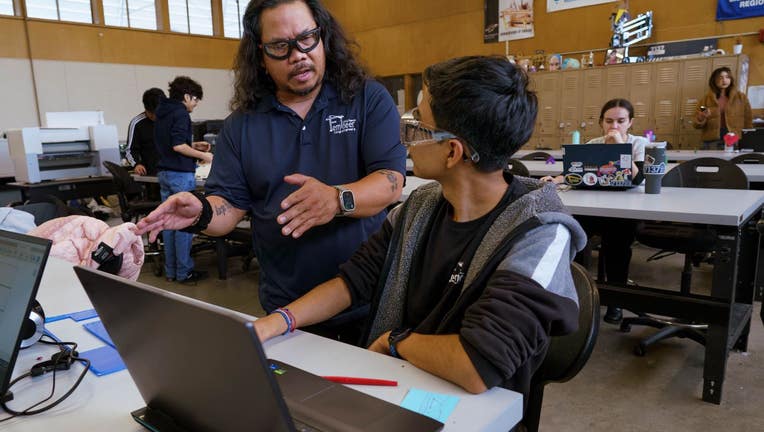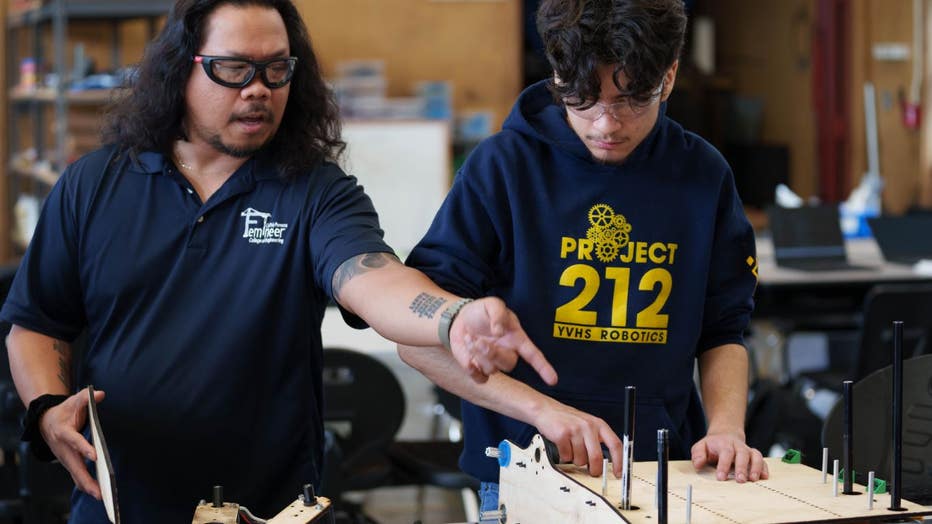California teacher of the year teaches robotics in Concord

Ygnacio Valley High School engineering teacher Joseph Alvarico, during his after school Project 212 YVHS Robotics lab at the Concord, Calif., school on Feb. 14, 2024. Alvarico, named Contra Costa County 2023 teacher of the year and also chosen as one
CONCORD, Calif. - Teachers who say teaching is their life have nothing on Joseph Alvarico.
One of five teachers named California Teacher of the Year in October by California Superintendent of Public Instruction Tony Thurmond -- and the only one in Northern California -- Alvarico teaches engineering and oversees the robotics program at Concord's Ygnacio Valley High School.
Alvarico also runs the school's college and career access pathway, which is likely why so many of his students also attend Diablo Valley College in Pleasant Hill (where Alvarico also teaches).
He takes Sundays off. It's when he likes to focus on graphic design, another skill he passes on to some of his students.
Teaching really is his life.
"I teach the basic engineering subject: Introduction to Engineering Design, which is where I teach them how to CAD (computer-aided design), how to draw 3D models. And then you print them," Alvarico said.
"I also teach manufacturing. And that's using machines. So I teach all the basics. And then after school, they take that basic knowledge and put them into use on the robotics competition team."
This particular afternoon school is out, which means about 20 or so robotics students are in a two-classroom workspace, designing, cutting, grinding, assembling and doing what robotics students do to prepare their creations for competitions against other schools.
Some of the robot battles are local -- four other high schools in the Mt. Diablo Unified School District have programs. Some are from other states and others come to U.S. meets from as far away as China. The team's next two competitions are in Los Angeles and Berkeley.
"A lot of these students get into engineering eventually, yeah," Alvarico said. "So this is a good fit for them. But we also have some students who are not even looking at engineering but doing business. Those students are in social media, making marketing materials. I'm helping them with learning real-life skills, communication and conflict management, teamwork, culture, and working with other students of different personalities. Those are the kind of things that they learn by doing this."
Alvarico has 38 robotics students. Though Ygnacio Valley is a Title I school, using specific federal funds for diverse student populations to ensure equal education opportunities, Alvarico tries not to use that money for the program.
He instead delivers lessons by tasking students with fundraising through advertising or monetary or supply donations. The students do the work to get their materials. Sometimes they go to former students coming back to help with the program. They also find mentors to help with the learning.
The program runs on a $60,000 to $70,000 annual budget, which is why most similar programs are at private schools.

Ygnacio Valley High School engineering teacher Joseph Alvarico, during his after school Project 212 YVHS Robotics lab at the Concord, Calif., school on Feb. 14, 2024. Alvarico, named Contra Costa County 2023 teacher of the year and also chosen as one
"We are a Title I school, which means a lot of our students come from low-income families," Alvarico said. "But I don't touch any of that because it's not enough for the rest of the school. So we try to be self-sustaining by going through different sourcing.
Alvarico, who majored in biology and taught in his native Philippines before coming to the U.S. in 2003 and learning engineering, said he's trying to create leaders.
The program's chief operating officer is 17-year-old Sara Venegas Guerrero, whose uncle is a mechanical engineer for Chrysler (and recently visited the students). Sara helped him and her father replace an engine when she was 7.
"It was after my dad accidentally crashed one of our old trucks. It was a Toyota '94, and my uncle was over at the time and we decided 'Hey, we're going to switch the engine. We're gonna (do an) engine swap between '94 and a '78,' I think it was."
Sara wants to be a mechanical engineer. She has applied for colleges, including -- not surprisingly -- in Michigan, where most of the American auto industry operates.
"I really like seeing the idea that I once drew in the computer come to life and being able to use it, program it, and say, 'Hey, this thing works.' And show it to other people and them liking them," Sara said.
"And I like to see the development of the kids," Sara said. "How they all get involved into one subsystem or they're like 'Oh, I really want to learn this.' Like they really put their soul (into it). So you're learning not only robotics, but leadership."
Alvarico send his students to middle schools to discuss engineering and robotics and actually teach a few simple lessons to hook them into the program once they get to high school.
"As a mentor teacher, my main thing is not to teach them technical skills, but to actually make leaders out of them so that they could run the team," said Alvarico, who started the robotics team in 2017. "I have leaders to help me out with how to guide the team, then a lot of the students also look up to the student leaders and so they follow them in the system."
Competitions usually involve an operator doing specific tasks on a basketball court-sized field, sometimes with the robots functioning autonomously. It usually involves picking something up and throwing it or doing specific maneuvers -- sometimes with other teams also on the field, trying to stop them.
Students are frequently in the robotics lab until 6 or 7 in the evening, as well as on Saturdays.
"They're here after school and they show up after school if they want to be here," Alvarico said. "A lot of the kids we have are low income, so instead of going home and playing video games or not doing anything at all, they elect to be here so they learn valuable skills."
Adriel Malapote, 18, was cutting a robot's side panel from a computer-assisted design. He said it's a robot that's basically going to pick things up and shoot them.
Malapote, who also takes classes at DVC, said there's a lot of pride in seeing something he built perform the assigned tasks during competition.
"I feel proud because like, I made that thing and it survived all of these things that we've done to it. And even having it break, it's like we learn from it," Malapote said. "I want to go into machining. Recently, I've been just doing 3D models and then I got introduced to (machining) anything at this point, (I want to) go exploring."
Johnathan Perez, 16, said he spends as much as 20 hours a week in the robotics lab. His contribution to the team involves knowing electrical components and software and mechanical skills.
He'd like to be a robotics engineer and eventually work for a company like Tesla.
"One day I joined the engineering pathway and then I saw this like robotics program and it looked kind of interesting and me and two other friends were like 'We should try it' and we joined and here we are today," he said.
The competition season usually lasts from January to April, with the rest of the year spent preparing and improving, often spinning off new ideas reverse engineered from other teams.
"At the start of the year, they actually brainstorm amongst themselves, and we've just got to make sure the physics are correct," Alvarico said. "For the most part they're the ones to come up with the ideas. Creation by watching."
Ygnacio Valley High School principal Jonathan Pike said the school is honored and proud of Alvarico, not only for his teaching, but for his connection to the community.
"He truly has taken a broad approach to building his program across multiple schools from elementary all the way up to Diablo Valley College," Pike said. "He supports all students wholeheartedly to include our fellow high school programs in our district."
"Joseph embodies a true model of the state teacher of the year, he supports underserved students by opening doors and opportunities for all and building the leadership in them to step through," Pike said.
Alvarico said he loves to learn.
He was a biology teacher in the Philippines when he decided to learn about computer programming and graphic design, two fields in which he then worked. When he came to the U.S., he initially taught at Oak Grove Middle School. When he moved down the road to Ygnacio Valley High, the principal at the time asked him to take over the engineering pathway. So he learned about engineering.
"I just love sharing what I learned," Alvarico said. "But my approach to teaching is different. Some teachers want to be, you know, the sage on the stage, knowing everything and teaching. I'm more of the guide on the side. I teach them the basic concept and then let them go."
He said projects are successful even when they aren't successful, because not everything works out in the real world.
"They still get credit, even if their project isn't successful, because I believe in risk taking," Alvarico said. "If a project didn't work out the way it should be, I still have them presented and then they tell me the reason why it didn't work. If we have more time, this is what we should be doing. That's a learning experience.
"School should be safe; a safe place for learning and a safe place for you to fail," he said.

